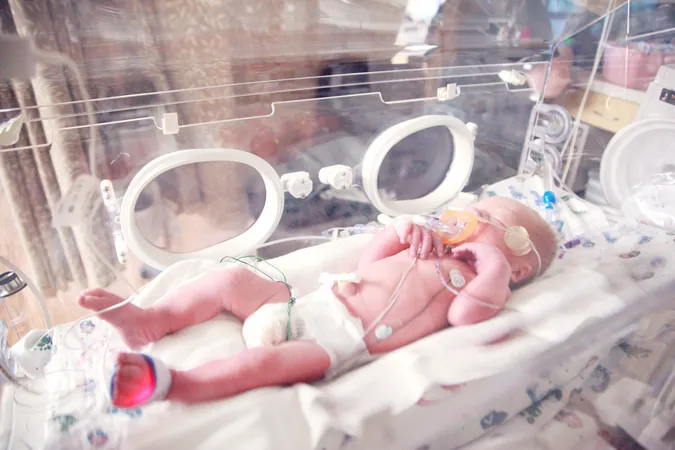
Shocking New Study Reveals Major Risk Factors for Bloodstream Infections in Neonates: What You Need to Know!
2025-04-02
Author: Mei
A groundbreaking study has unveiled critical risk factors for healthcare-associated bloodstream infections (BSIs) in neonates within Neonatal Intensive Care Units (NICUs). Published in JAMA Network Open, the research underscores the significant impact of medical devices and antibiotic use on infection rates.
In this extensive cohort study involving 6,410 neonates admitted for at least three days, the incidence of healthcare-associated BSIs was determined to be alarmingly high at 6.09 per 1,000 patient-days. Specifically, neonates who remained in the NICU for seven days or longer faced a 5.8% risk of developing BSIs after the seventh day of hospitalization, translating to a concerning incidence rate of 3.22 per 1,000 patient-days.
One of the most striking findings revealed that neonates who were administered antibiotics during their initial week faced nearly three times the risk of developing subsequent BSIs. The researchers noted, "These findings are particularly notable given the frequent use of prolonged antibiotic courses in the absence of positive blood, urine, or cerebrospinal fluid (CSF) cultures." While antibiotics can be life-saving, their extensive use might lead to severe repercussions—including drug toxicity, an elevated risk of necrotizing enterocolitis, late-onset sepsis, retinopathy of prematurity, and disruption of the delicate neonatal microbiome. Such disruptions could potentially predispose infants to chronic health issues later in life.
Key Insights:
- The use of central venous catheters, respiratory support systems, and urinary catheters significantly escalates the likelihood of BSIs, stressing the urgent need for enhanced infection prevention and control (IPC) protocols in NICUs.
- Bacterial infections in these vulnerable infants are predominantly caused by gram-negative organisms, with alarming resistance rates to vital antibiotics. A staggering 85.5% of tested isolates demonstrated resistance to third- and fourth-generation cephalosporins, while 44.8% resisted carbapenems.
- The study highlights not just the prevalence of infections but also the daunting challenge of antimicrobial resistance, emphasizing an urgent call for improved antimicrobial stewardship within neonatal departments.
Study Details:
This multicenter, prospective cohort study spanned from May 2017 to July 2019 across three NICUs in India. Among the participants, 3,560 (55.5%) were male, with a median gestational age of just 34 weeks. Each neonate was monitored closely from admission until discharge, transfer to another unit, or death. Researchers defined the occurrence of healthcare-associated BSIs through positive blood cultures collected on or after the third day of admission.
Other crucial findings indicate that most infections resulted from gram-negative bacteria, amplifying the need for NICUs to enforce stricter IPC measures. The overwhelming presence of antibiotic-resistant strains further raises the alarm about the future of neonatal care.
In summary, this study serves as a clarion call for NICUs to prioritize infection prevention and control, focusing particularly on the challenges posed by indwelling medical devices and the risks associated with antibiotic overuse. What does this mean for future neonatal care practices? Action must be taken now to safeguard the health of our most vulnerable patients!

 Brasil (PT)
Brasil (PT)
 Canada (EN)
Canada (EN)
 Chile (ES)
Chile (ES)
 Česko (CS)
Česko (CS)
 대한민국 (KO)
대한민국 (KO)
 España (ES)
España (ES)
 France (FR)
France (FR)
 Hong Kong (EN)
Hong Kong (EN)
 Italia (IT)
Italia (IT)
 日本 (JA)
日本 (JA)
 Magyarország (HU)
Magyarország (HU)
 Norge (NO)
Norge (NO)
 Polska (PL)
Polska (PL)
 Schweiz (DE)
Schweiz (DE)
 Singapore (EN)
Singapore (EN)
 Sverige (SV)
Sverige (SV)
 Suomi (FI)
Suomi (FI)
 Türkiye (TR)
Türkiye (TR)
 الإمارات العربية المتحدة (AR)
الإمارات العربية المتحدة (AR)